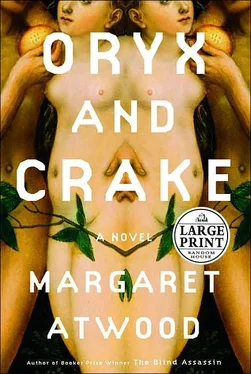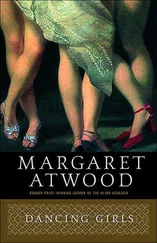Not so her brother. He had no luck. He didn’t want to sell flowers like a girl, and he hated smiling; and when he did smile, the effect was not good because of his blackened tooth. So Oryx would take some of his leftover roses and try to sell them for him. Uncle En didn’t mind at first—money was money—but then he said Oryx shouldn’t be seen too much in the same locations because it wouldn’t do for people to become tired of her.
Something else would have to be found for the brother—some other occupation. He would have to be sold elsewhere. The older children in the room shook their heads: the brother would be sold to a pimp, they said; a pimp for hairy white foreign men or bearded brown men or fat yellow men, any kind of men who liked little boys. They described in detail what these men would do; they laughed about it. He would be a melon-bum boy, they said: that’s what boys like him were called. Firm and round on the outside, soft and sweet on the inside; a nice melon bum, for anyone who paid. Either that or he would be put to work as a messenger, sent from street to street, doing errands for gamblers, and that was hard work and very dangerous, because the rival gamblers would kill you. Or he could be a messenger and a melon boy, both. That was the most likely thing.
Oryx saw her brother’s face darken and grow hard, and she wasn’t surprised when he ran away; and whether he was ever caught and punished Oryx never knew. Nor did she ask, because asking—she had now found out—would do no good.
One day a man did take Oryx by the hand and say she should come into the hotel with him. She gave him her shy smile, and looked up sideways and said nothing, and pulled her hand away and told Uncle En afterwards. Then Uncle En said a surprising thing. If the man asked again, he said, she was to go into the hotel with him. He would want to take her up to his room, and she must go with him. She should do whatever the man asked, but she shouldn’t worry, because Uncle En would be watching and would come to get her. Nothing bad would happen to her.
“Will I be a melon?” she asked. “A melon-bum girl?” and Uncle En laughed and said where did she pick up that word. But no, he said. That was not what would happen.
Next day the man appeared and asked Oryx if she would like some money, a lot more money than she could make by selling roses. He was a long white hairy man with a thick accent, but she could make out the words. This time Oryx went with him. He held her hand and they went up in an elevator—this was the frightening part, a tiny room with doors that shut, and when the doors opened you were in a different place, and Uncle En hadn’t explained about that. She could feel her heart thumping. “Don’t be afraid,” said the man, thinking she was afraid of him. But it was the other way around, he was afraid of her, because his hand had a tremor. He unlocked a door with a key and they went in, and he locked the door behind them, and they were in a mauve-and-gold-coloured room with a giant bed in it, a bed for giants, and the man asked Oryx to take off her dress.
Oryx was obedient and did as she was told. She had a general idea of what else the man might want—the other children already knew about such things and discussed them freely, and laughed about them. People paid a lot of money for the kinds of things this man wanted, and there were special places in the city for men like him to go; but some wouldn’t go there because it was too public and they were ashamed, and they foolishly wanted to arrange things for themselves, and this man was one of that kind. So Oryx knew the man would now take off his own clothes, or some of them, and he did, and seemed pleased when she stared at his penis, which was long and hairy like himself, with a bend in it like a little elbow. Then he kneeled down so he was on her level, with his face right next to hers.
What did this face look like? Oryx couldn’t remember. She could remember the singularity of his penis but not the singularity of his face. “It was like no face,” she said. “It was all soft, like a dumpling. There was a big nose on it, a carrot nose. A long white penis nose.” She laughed, holding her two hands over her mouth. “Not like your nose, Jimmy,” she added in case he felt self-conscious. “Your nose is beautiful. It is a sweet nose, believe me.”
“I won’t hurt you,” said the man. His accent was so ridiculous that Oryx wanted to giggle, but she knew that would be wrong. She smiled her shy smile, and the man took hold of one of her hands and placed it on himself. He did this gently enough, but at the same time he seemed angry. Angry, and in a hurry.
That was when Uncle En plunged suddenly into the room—how? He must have had a key, he must have been given a key by someone at the hotel. He picked Oryx up and hugged her and called her his little treasure, and yelled at the man, who seemed very frightened and tried to scramble into his clothes. He got caught in his trousers and hopped around on one foot while trying to explain something with his bad accent, and Oryx felt bad for him. Then the man gave money to Uncle En, a lot of money, all the money in his wallet, and Uncle En went out of the room carrying Oryx like a precious vase and still muttering and scowling. But out on the street he laughed, and made jokes about the man hopping around in his snarled-up trousers, and told Oryx she was a good girl and wouldn’t she like to play this game again?
So that became her game. She felt a little sorry for the men: although Uncle En said they deserved what happened to them and they were lucky he never called the police, she somewhat regretted her part. But at the same time she enjoyed it. It made her feel strong to know that the men thought she was helpless but she was not. It was they who were helpless, they who would soon have to stammer apologies in their silly accents and hop around on one foot in their luxurious hotel rooms, trapped in their own pant legs with their bums sticking out, smooth bums and hairy bums, bums of different sizes and colours, while Uncle En berated them. From time to time they would cry. As for the money, they emptied their pockets, they threw all the money they had at Uncle En, they thanked him for taking it. They didn’t want to spend any time in jail, not in that city, where the jails were not hotels and it took a very long time for charges to be laid and for trials to be held. They wanted to get into taxis, as soon as they could, and climb onto big airplanes, and fly away through the sky.
“Little SuSu,” Uncle En would say, as he set Oryx down on the street outside the hotel. “You are a smart girl! I wish I could marry you. Would you like that?”
This was as close to love as Oryx could get right then, so she felt happy. But what was the right answer, yes or no? She knew it was not a serious question but a joke: she was only five, or six, or seven, so she couldn’t get married. Anyway the other children said that Uncle En had a grown-up wife who lived in a house elsewhere, and he had other children as well. His real children. They went to school.
“Can I listen to your watch?” said Oryx with her shy smile. Instead of , was what she meant. Instead of marrying you, instead of answering your question, instead of being your real child. And he laughed some more, and he did let her listen to his watch, but she didn’t hear any little voice inside.
One day a different man came, one they’d never seen before—a tall thin man, taller than Uncle En, with ill-fitting clothes and a pock-marked face—and said that all of them would have to come with him. Uncle En had sold his flower business, this man said; the flowers, and the flower-sellers, and everything else. He’d gone away, he’d moved to a different city. So this tall man was the boss now.
Читать дальше












